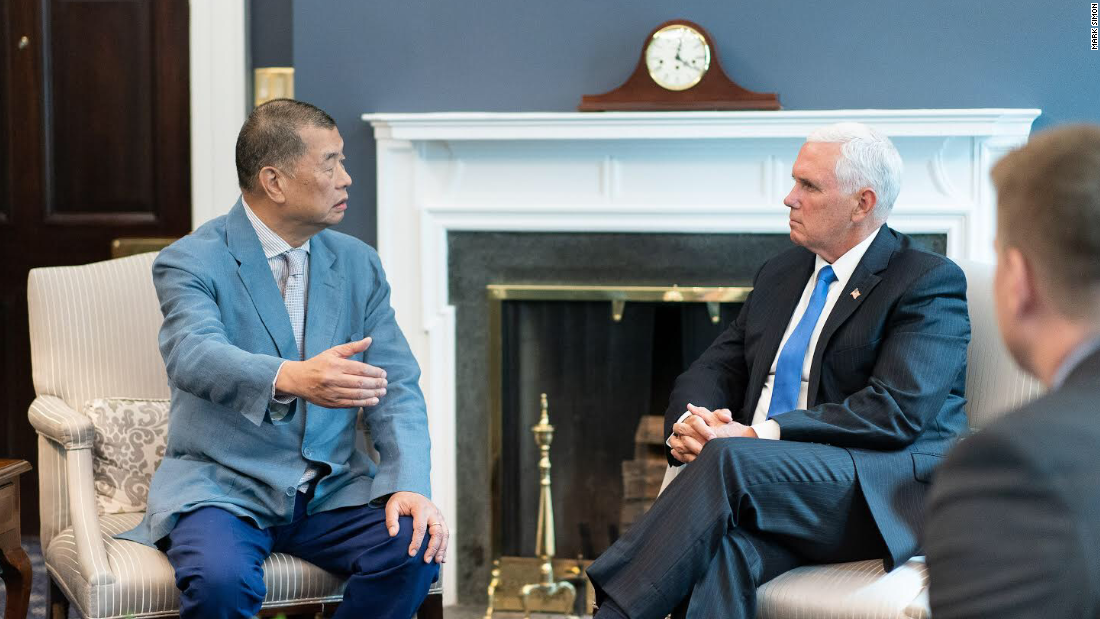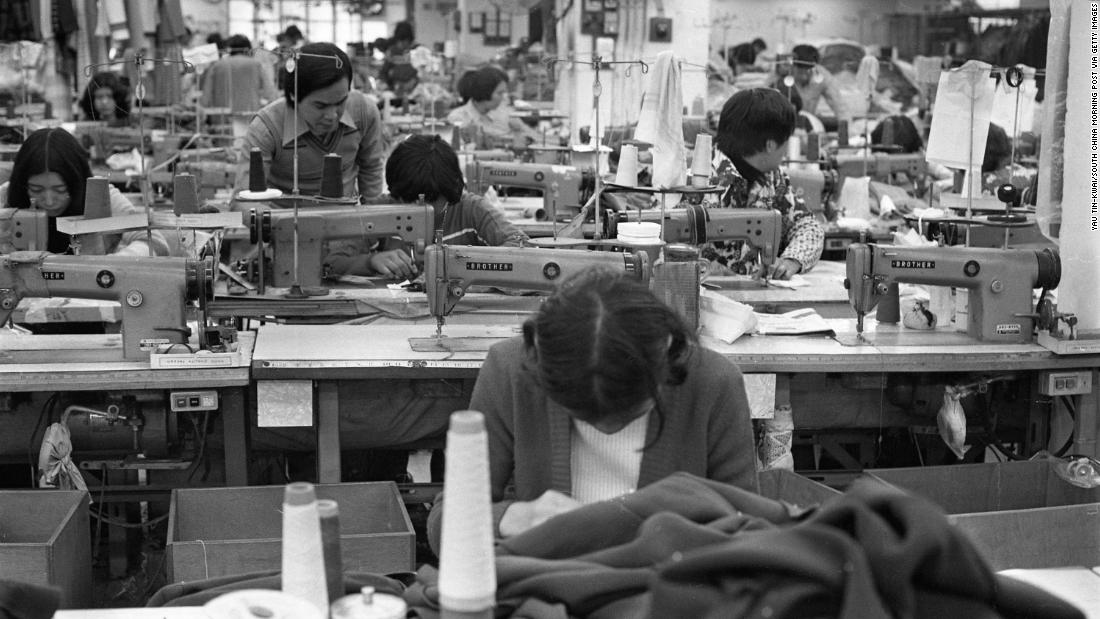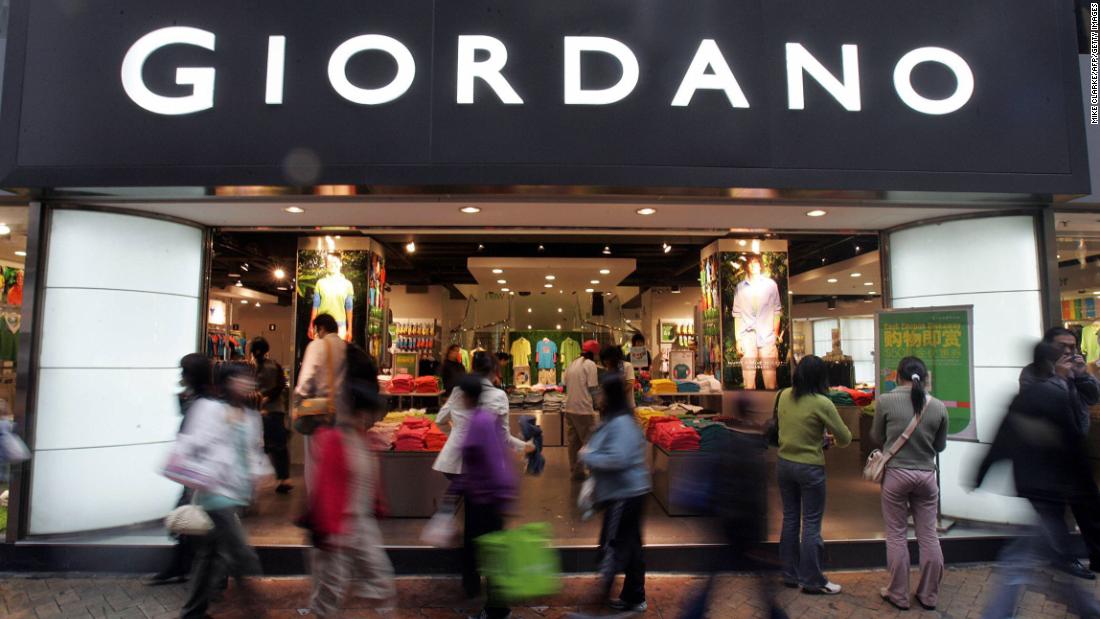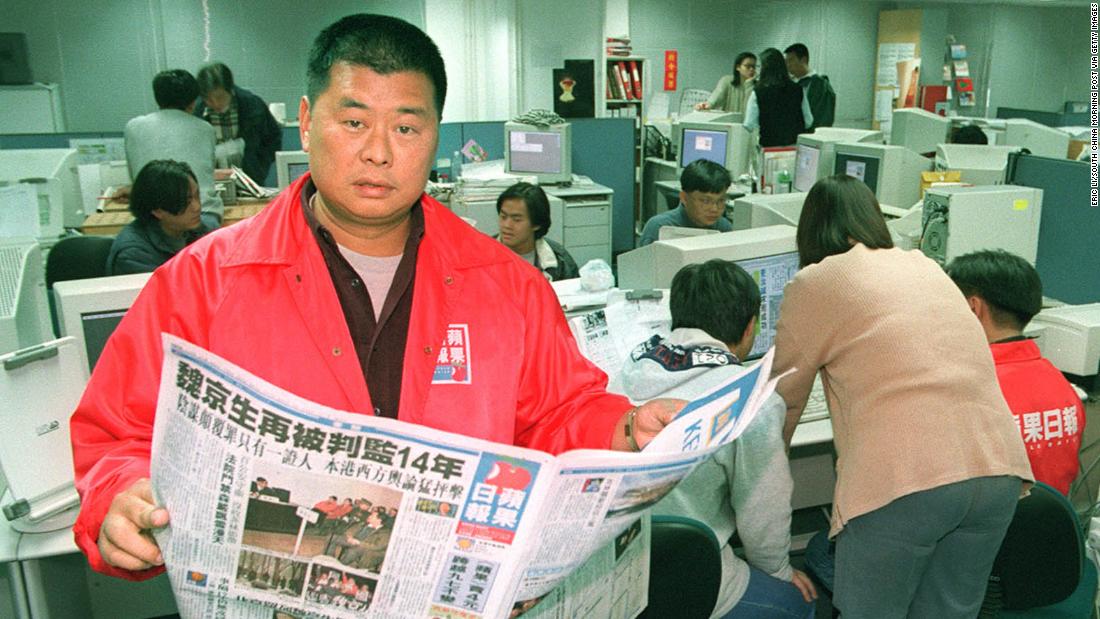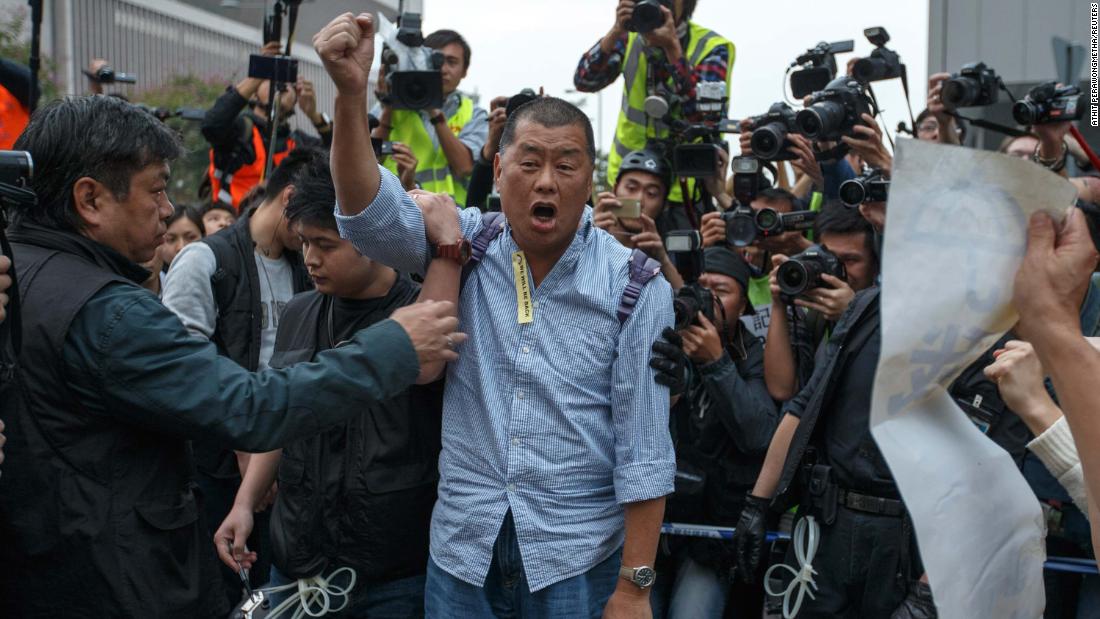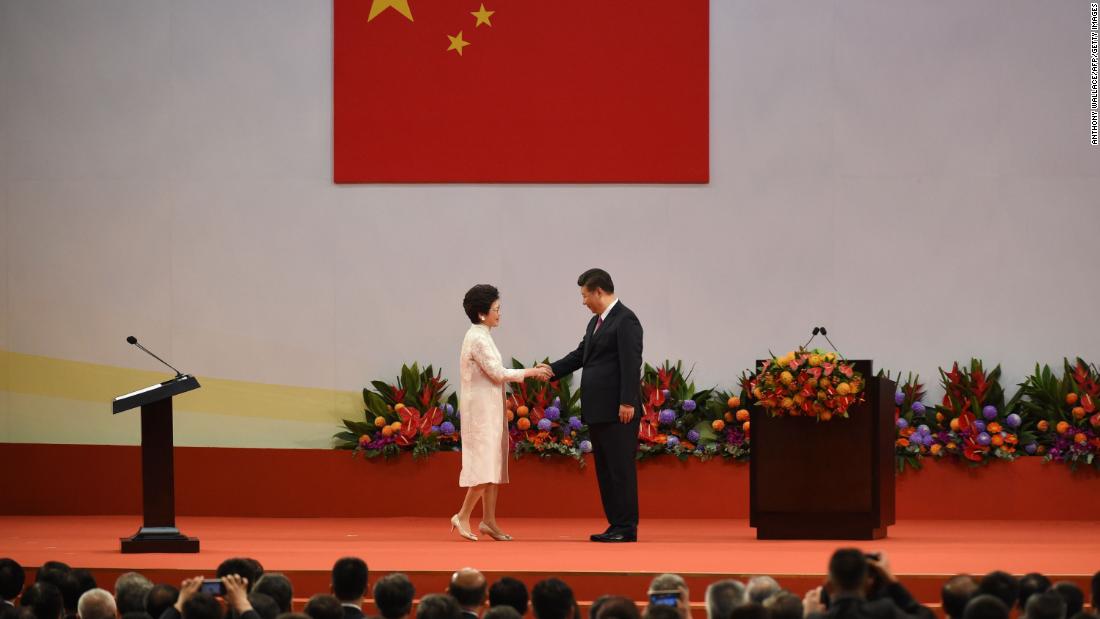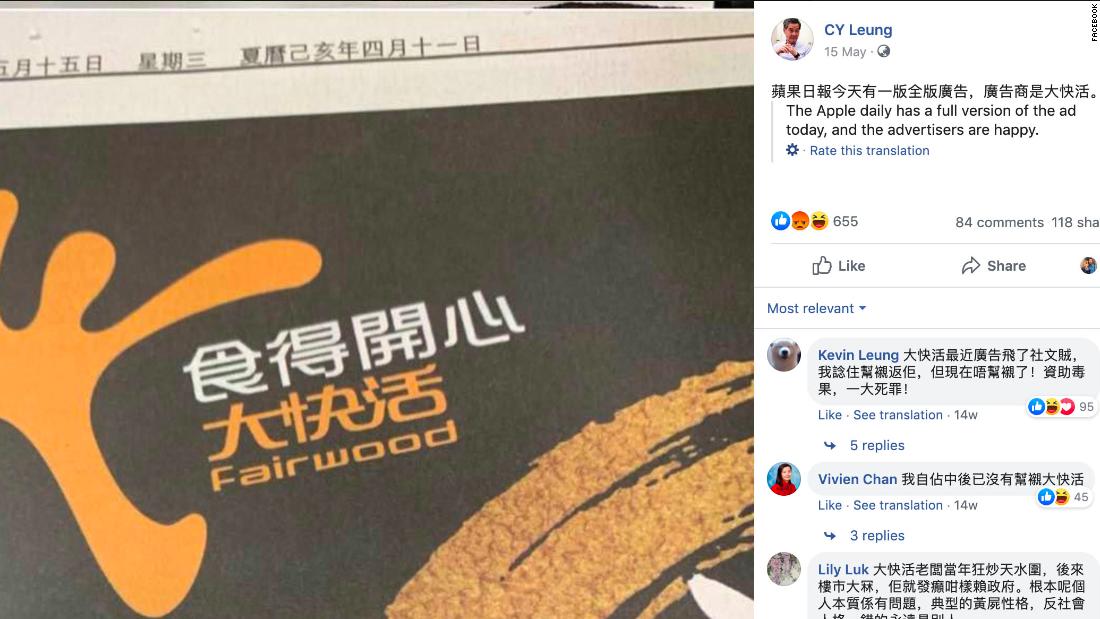Why pro-democracy troublemaker Jimmy Lai is the only Hong Kong multi-millionaire standing up to China
By
Jenni Marsh, CNN
Updated 0512 GMT (1312 HKT) August 28, 2019
Hong Kong (CNN)Jimmy Lai has been a public target for decades.
It all started after the
Hong Kong business tycoon — a refugee from China — reinvented himself in the mid-1990s as the founder of the city's provocative, anti-Beijing tabloid,
Apple Daily.
One of the advertisements that introduced the newspaper to the world made Lai's point in the bluntest of ways: By showing Lai sitting in a dark warehouse with a red apple on his scalp, being pelted with incoming arrows fired by a shadowy figure.
Since then, Lai's role as one of Hong Kong's most prominent rabble-rousers has threatened his fortune, subjected him to death threats and made him a symbol of the city's tensions with mainland China.
When Britain handed Hong Kong back to China in 1997, the city was guaranteed its own legal system and certain democratic freedoms until 2047, when it will likely return in total to Beijing. Over the past three months, millions have flooded Hong Kong's highways in marches against Beijing's perceived encroachment on those treasured freedoms.
Apple Daily has become the city's biggest official champion of that movement. The newspaper of the protesters. Its strident front pages rally citizens to go out and march, it has given away posters to raise at demonstrations, and it regularly taunts the government for its failures.
In a town of tycoons, Lai is the only multi-millionaire who seems prepared to openly jeopardize his fortune for Hong Kong's freedom. The 70-year-old is frequently seen at the marches, in the pouring rain or blazing summer heat.
To his supporters, Lai is a brave democracy fighter. But his detractors say that Lai and his muckraking publication are a
black hand for the United States and cause
chaos. In recent years,
firebombs have been lobbed at his gated home, anobituary claiming he died from
AIDS has run in a rival publication and Lai's political donations have subjected him to an
anti-corruption case. Lai denied wrongdoing, and the case against him was ultimately dropped.
Jimmy Lai met with US Vice President Mike Pence in July 2019.
That Lai has ties with the United States is undeniable. Last month, he flew to Washington to discuss with US Vice President Mike Pence, Secretary of State Mike Pompeo and National Security Adviser John Bolton how fundamental Hong Kong's freedom is to the US' standoff with China.
"The (new) Cold War is actually a rivalry of competing values," Lai says, framing the current US-China trade war as a standoff of between democracy and authoritarianism. "We in Hong Kong are fighting for the shared values of the US against China. We are fighting their war in the enemy camp."
It's a battle Lai says he's prepared to die for.
Chinese refugee
Lai had already led an extraordinary life by the time he founded Next Digital group, which owns Apple Daily, in the 1980s.
As the Great Chinese Famine gripped mainland China in 1960, Lai smuggled himself out of the southern mainland province of Guangdong and into Hong Kong in the bottom of a fishing boat. He arrived in the city at the age of 12 and dirt poor.
Lai says he became an odd jobs guy at a textile factory, making 60 Hong Kong dollars ($7) a month and living in an apartment with 10 others in the slum neighborhood of Sham Shui Po -- still one of Hong Kong's most impoverished districts.
The Hollywood Knitwear Factory in Kwun Tong in the 1970s when Hong Kong's textile industry was booming.
On his first day, he recalls how coworkers took him for breakfast. Relief from "the anxiety of hunger" was overwhelming, says Lai. "This freedom was the first feeling I had about Hong Kong and it never disappointed me," Lai says. "Never, until now."
This freedom was the first feeling I had about Hong Kong and it never disappointed me. Never, until now
JIMMY LAI, FOUNDER APPLE DAILY
After the Communists assumed power of China in 1949, Hong Kong's population swelled by 1,000 people a day during the 1950s as Chinese migrants flooded over the border. Most were "daring and entrepreneurial" survivors willing to take risks, Lai recalls. His twin sister was one of the so-called freedom swimmers, who literally swam from China to the city. She went on to become a major property developer in Canada.
"Hong Kong was a land of opportunity," Lai says of that era.
Within two decades, Lai had learned English, worked his way up the factory floor to the position of salesman and decided to start his own retail line. On one trip to New York during fabric sampling season, he bought a pizza. Written on the napkin was the name Giordano.
That became the name of his wildly successful, casual men's clothing chain, which made Lai his first fortune.
"I was stupid enough to think that if I called it Giordano, people would think that it's an Italian brand name," he says. It worked. By 1992, the
group had 191 outlets, made 9 million garments annually and had a turnover of 1.6 billion Hong Kong dollars ($211 million).
Shoppers pass a Giordano retail store on a rainy day in Hong Kong, 22 March 2005.
"He's kind of a legend in terms of his business success," says Clement So, associate dean in the school of journalism at the Chinese University of Hong Kong. "Not only for what he did in the news media but in other kinds of industry."
Business was booming, but two things happened in the late 1980s that would derail the course of Lai's life.
First, on June 4, 1989, tanks rolled into
Tiananmen Square to disperse young pro-democracy protesters, changing China forever. Estimates of the death toll range from several hundred to thousands.
Lai says he wasn't political at the time, "but I always had a very strong yearning for freedom because of my experience in China."
Hong Kong was still under British rule but barreling towards reunification with China in 1997. As the city watched the Tiananmen crackdown in horror, Giordano began producing T-shirts with pro-student slogans.
Around the same time, Lai says he got divorced from his first wife. "I thought I was a very eligible guy," he says. "That was something shocking to me."
Shortly afterward, Lai was interviewed by local journalist Theresa Lai. The pair fell in love and married. Next, he became a media baron.
An Apple a day
Today Lai lives in a white, gated house in an upmarket nook of Kowloon. Security staff are stationed outside the property. Paparazzi from rival newspapers photograph all who leave and enter, putting pressure on Lai's personal life and looking for signs that he meets with pro-US figures.
Inside, melodious Chinese hwamei birds chirp in tall white cages, dramatic art works adorn the walls, while giant bromeliads and orchids brighten each corner. "I love flowers," says Lai, with intermittent clips of an upper-class British accent, as he enjoys a breakfast of strawberries and egg sandwiches served on china platters.
The figure he cuts at home, where he regularly hosts politicians, journalists and influential figures to discuss Hong Kong's democratic future -- or lack of it -- is in stark contrast to his reputation as a brash, instinct-driven, ex-factory manager whose formal education ended in primary school.
That public persona began in 1994, when Lai published an incendiary column in a magazine owned by his Next Digital group,
describing then Chinese Premier Li Peng, known as the "butcher of Beijing" for his role in the Tiananmen crackdown, as "the son of a turtle's egg with zero IQ" — a profoundly offensive slur in Chinese.
Jimmy Lai with his Chinese-language Apple Daily newspaper which sparked a price war when it launched in 1995.
Beijing responded then as it might do now. It penalized his clothing business.
Lai says Giordano's licenses were
revoked across much of mainland China. In 1994, Lai sold his stake in the company, and the following year he launched Apple Daily, with a 100 million Hong Kong dollar
promotional campaign, two years before the British handed the city back to China.
"It's my nature to be a rebel -- to be a revolutionary," Lai says. "I express it in business. Whenever I am in business, I create something different from the norm. That's the reason why I have been successful more than other people. I don't believe in incremental improvement."
It's my nature to be a rebel -- to be a revolutionary ... I don't believe in incremental improvement."
JIMMY LAI, FOUNDER OF APPLE DAILY NEWSPAPER
He applied the mass-market ethos of Giordano to his newspaper: It was low cost, populist and sensational. Modeled visually on USA Today, it "shook the media landscape in Hong Kong in a revolutionary way," says Clement So, the Chinese University of Hong Kong associate dean. The paper didn't care for balanced reporting: This was advocacy journalism, with a strong dose of saucy celebrity gossip.
On news stands, Lai sparked a citywide price war, virtually giving away the sensational title at two Hong Kong dollars (25 cents), the price vendors charged to sell it. "Other papers quickly imitated without much success," says So. "The style of writing, the use of big photos. The pagination. Everything. There was a term called 'Apple-ization.'"
The newspaper became the city's most-talked about outlet -- a reputation it has maintained through its pioneering Apple Extra platform, which controversially animates breaking news events from murders to protests. The publication also found big success in Taiwan, a self-governed Chinese democracy which Beijing claims as its own territory. "Apple Daily was very lucrative in the beginning," says Willy Lam, a professor in history at the Chinese University of Hong Kong.
By 2008, Lai was worth $1.2 billion, according to the
Forbes rich list.
Jimmy Lai protests during 2014's Umbrella Movement for democracy in Hong Kong.
With other media moguls unwilling to risk the commercial fall out of facing off with Beijing post-1997, Apple Daily became the city's sole publication regularly criticizing China. "They were so afraid of the Communists, they left me an independent media market almost to myself," Lai says.
The paper's uncompromising stance, which critics say can lack the editorial balance of including the opposing side's viewpoint, coincided with swathes of Hong Kong's media becoming more pro-Beijing.
Basically, today people choose their media depending on what is their political affiliation
MICHAEL TIEN, PRO-BEIJING LAWMAKER
"Basically, today people choose their media depending on what is their political affiliation," says Michael Tien, a pro-Beijing lawmaker and fellow textile tycoon whose G2000 clothing chain has more than 700 outlets globally. That echo chamber has, in turn, led Hong Kong society itself to become more polarized, even between "husband and wife, between parents and kids, between friends," says Tien.
"Nobody trusts the media. You don't trust the police. They don't trust the government," Tien says.
Societal fragmentation has been a theme of the current unrest, as protesters and police have faced off in a series of violent clashes that have been reported from vastly different perspectives across the media.
Some Hong Kongers back Beijing. Many are pro-democracy. Others describe themselves as "blue ribbon," meaning they support the police. Supporters of the movement and more liberal people identify as "yellow ribbon."
Many make a point of defining themselves as Hong Kongers, rather than broadly Chinese, to distinguish their identity from that of those living across the border -- the birthplace of many of their parents or grandparents.
For Lai, a Hong Konger is someone from a small Chinese island who shares the values of the West. "The Hong Kong identity this time ... has really emerged much more into our consciousness," he says. "We identify as Hong Konger like never before."
A black hand for the US
In early 2018, a 19-year-old Hong Kong resident allegedly killed his pregnant girlfriend in Taiwan and returned to the city before being arrested. There was nothing Taiwanese police could do; Hong Kong had no extradition agreement with Taiwan, or any Chinese territory.
In
March 2019, Hong Kong Chief Executive Carrie Lam proposed a solution: an update to the city's fugitive laws that would allow criminals to be extradited to Taiwan -- and mainland China.
Lai was in the United States when the bill was announced and was warned by a US politician over breakfast about the danger it posed. "I really alerted myself," remembers Lai. "I looked at it again and said, 'Shit, this is horrible.' I knew it was going to be a big thing."
He was right. The bill ended up sparking nearly three months of often violent demonstrations in Hong Kong, with more than 800 mostly young people arrested on charges including rioting. Protesters have paralyzed the city's airport on two occasions.
Speaking to Lai it seems that many of his defining moments were sparked by America. The name "Giordano" came from a New York pizza house napkin; when the brand initially struggled to make money, a trip to McDonald's inspired Lai to streamline its offerings, as the US burger chain had done; Apple Daily was modeled on the USA Today.
His top aide in Hong Kong, Mark Simon, is the son of a former CIA employee.
That last detail never fails to tantalize onlookers. For decades, one of the key charges against Lai has been that he is a CIA stooge, and the Apple Daily a tool of the United States.
59 people are talking about this
Earlier this month, China's state-run media branded Lai and three other well-known pro-democracy figures in the city as Hong Kong's "Gang of Four" -- a reference to the group that tried to overthrow Mao Zedong and seize power from the Communist Party in the 1970s.
The People's Daily claimed Lai was part of a quartet of "secretive middlemen and modern traitors," as Beijing tried to blame the unrest in Hong Kong on foreign forces.
The pro-Beijing lawmaker Tien, for one, believes that Washington pumps money into Hong Kong's democracy movement to provide a "continuous force to destabilize China," although he admits he has no evidence to substantiate this claim.
Lai calls the idea of a US-funded color revolution "ridiculous."
"If the US is funding this the evidence would be so self-evident," he says. "You can't find even one person to stand up and say, 'Hey, I got money from the US.'"
But he does view Washington as a key ally for Hong Kong -- as that early warning on the extradition bill proved. When Lai returned from that trip, he began raising the alarm. Journalists at first weren't too ruffled, he says.
Hong Kong's Chief Executive Carrie Lam shakes hands with China's President Xi Jinping after being sworn in as the territory's leader in 2017.
"Lam was flying high before this extradition law," says Lai. "Xi Jinping was taking her hand (at public events), she was
walking in front with him, she really wanted to do something great for her boss. She knew this was a great opportunity. And actually it was almost. Because people really didn't pay attention to it at first."
But the business community was more alarmed. "All of them have had to pay something to get the protection of the people that control them in mainland China," says Lai. More than that, they understood the law could be used by Chinese contacts as a tool for blackmail; if a Chinese partner wanted to control their Hong Kong counterpart they could potentially report them to the authorities across the border, where there is a 99% conviction rate.
Opposition to the bill slowly mounted, starting with a march of 12,000 people on March 31, led by Lam Wing-kee, a bookseller who says he was kidnapped from Hong Kong by mainland Chinese agents in 2015, after selling tomes critical of Beijing. China has
denied abducting him.
Lam steamed ahead.
The marches continued: 160,000 people, then 1 million. Still the bill remained set to go through the city's top legislative body, Legco, in early June. Finally an estimated 2 million people took to the streets on June 16. The bill was suspended, but it was too late to quell the anger it had stirred.
Tien concedes it's unlikely that Washington engineered a 2-million-man march, but as demonstrators increasingly wave American flags in the protests -- something Lai says is just a publicity play to attract international TV cameras -- the pro-Beijing politician wants an independent inquiry into whether the CIA is funding a color revolution in the city.
A senior US administration official has denied that Washington is sponsoring or inciting the demonstrations, and President Donald Trump also appeared to reject the suggestion last week, when he tweeted that "many are blaming me, and the United States, for the problems going on in Hong Kong. I can't imagine why?"
Freedom over fortune
Founding Apple Daily, and taking on Hong Kong's fight for democracy, gave Lai "a meaning in life that I never had" as a textile tycoon. "The mission," he says, "it has such a wonderful meaning."
The city's other tycoons have avoided wading into the crisis. "If you're a business person in Hong Kong, it is difficult to avoid the China market," says Lam, the history professor. "And once you are in the China market your investment becomes a hostage, which the Chinese government is never shy of using as a means to exert influence."
The closest that Hong Kong's richest man Li Ka-shing, who is worth over $31 billion according to Forbes, has got to commenting on the political crisis was publishing two cryptic messages in the many of the city's newspapers this month (Apple Daily wasn't one of them). The cryptic nature of his advice to exercise caution was unmistakable -- across the city, readers speculated about whether he was addressing the protesters or Beijing, or both.
See Global Times's other Tweets
"No other tycoon is willing to" be so outspoken against China as Lai, says Clement So, the Chinese University of Hong Kong professor. "That's what has made Lai so unique."
That outspokenness doesn't come without dangers.
In 2015, Molotov cocktails were hurled at the headquarters of Next Media and Lai's home in the early hours of the morning. "We're not shocked. Unfortunately, violence has become a regular feature of Hong Kong now in the political discourse. That's just a simple fact," Mark Simon, Lai's assistant, told CNN at the time.
Today, Lai has a personal security detail at his home, but the self-confessed troublemaker says he has never forgotten what it was like to be poor, and he has no intent on abandoning the masses in the crusade they share with him for democracy.
"The young people see no future for themselves -- everything is expensive," says Lai. "Even to live in a small room is too expensive for them." The land of opportunity that entrepreneurs like Lai and Li Ka-shing thrived in when they arrived in Hong Kong has long disappeared.
"With this extradition law people thought, Okay, that's the last straw, we have to fight. We have to fight in front of this last frontier," he says.
That fight might not be good for the finances of Apple Daily.
The extent of Lai's personal wealth today is unknown, but he fell off the Forbes Hong Kong Rich List in 2009. Big corporations with interests in mainland China, such as Cathay Pacific or Li's CK Hutchison Holdings, never advertise in Apple Daily. Hong Kong's previous chief executive, CY Leung, who the publication has long antagonized for his close ties to Beijing, regularly
posts pictures on his Facebook page of companies that advertize in Apple Daily. "Apple Daily is public enemy number 1 for CY Leung," says Lam, the history professor.
Former Hong Kong chief executive CY Leung posts photographs to his Facebook page of companies that advertize with Apple Daily.
Operating in this political landscape, coupled with a general decline in print sales and advertising, has squeezed Apple Daily financially. The newspaper's circulation is now 200,000 a day, two-thirds of what it was a decade ago, with
1.5 million readers online. Its daily ad revenue has halved over the past three years. Next Digital has posted a
net loss for the past three years.
Earlier this year, the newspaper introduced a pay wall of three Hong Kong dollars for access until September. Next month, the publication is hoping that people will pay 50 Hong Kong dollars a month to subscribe.
"The timing is good for Apple Daily because people want news," says Clement So, the media expert. "Lai would like to get financial support from online readers, if he can do it would throw him a lifeline. But if not successful, it is a real worry whether he cannot sustain his operation in the long run."
Meanwhile, bootstrapping online outlets, such as
Stand News and
HKC News, are growing competitors in the pro-democracy space. By shooting chat shows on smartphones and employing a small staff, they keep overheads low enough to avoid needing Beijing-tied advertisers.
2047 on the horizon
To many, the year 2047, when Hong Kong will likely return to full Chinese rule,once felt like a futuristic date. But now that it is just 28 years away, it's something Hong Kongers can imagine in their lifetime. The fight for democracy has become more urgent, more controversial -- but potentially less achievable, as China's economic rise gives Beijing more political power to resist democracy.
"I don't know where (the protests are) going to end," Lai says, "but one thing I know, with the world watching over us ... I think Trump, the US, cannot back off (from supporting Hong Kong) now. They can only go further and further. Not financially, but politically and morally."
Earlier this month, Pence said that chances of a trade deal with China would diminish if Hong Kong's laws were violated by Beijing, and criticized the country's human rights violations as antithetical to American ideals. Trump also
tweetedthat Chinese President Xi Jingping should meet with protesters.
28.7K people are talking about this
If mounting international pressure coincides with an economic slowdown and job losses, China could change, speculates Lai. "That doesn't mean that the Communist Party will collapse," he adds. "But it might mean that Xi would have to step down and a more liberal government will take over and slowly we will be on the right way." But there is no sign of this happening anytime soon.
Meanwhile, Hong Kong's economy is taking a hit across the tourism, aviation and retail sectors from the disruption. Michael Tien, the pro-Beijing lawmaker, says that sales for his retail business were down 40% in August. "Nobody feels good anymore to come out and consume," he says. The Hong Kong government has announced a
$2.4 billion stimulus package to help the economy grow amid the unrest.
For Lai, if the financial hub's economy has to suffer for freedom, so be it: The prospect of a struggle doesn't give people "an excuse not to fight."
"If we fight, we might have a miracle happen," he says. "If we don't fight, we have to submit to the tyranny. I just think that if we have been able to eliminate slavery we have the ability to eliminate tyranny, too. That's hopeful."





